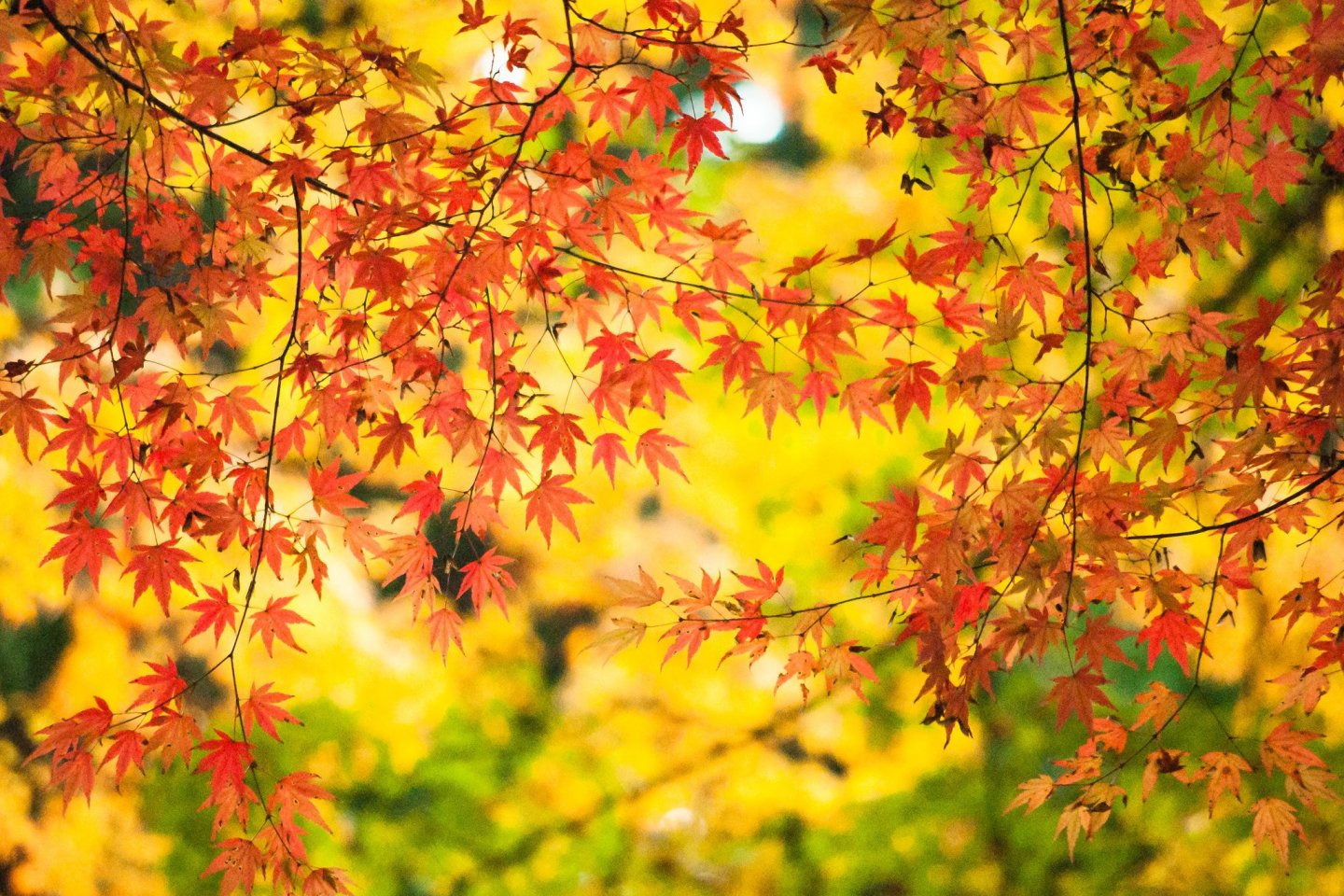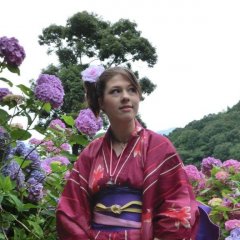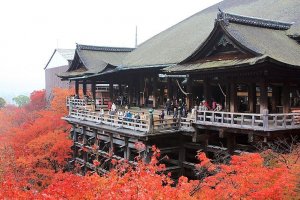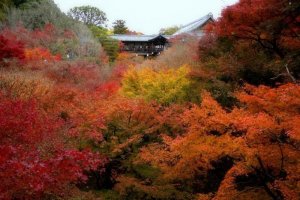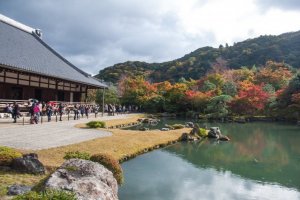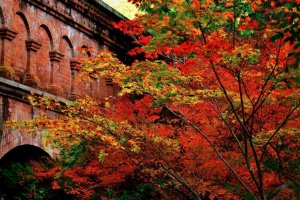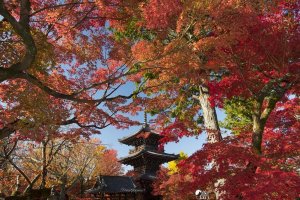Autumn in Kyoto is a special time. Granted that any time of year is beautiful in Kyoto, but fall is especially lovely. Let’s discover the best places for fall colors in Kyoto.
Kyoto’s best autumn leaves
Get your camera ready! Here are our top picks for places to see the koyo or colored leaves in Kyoto:
1. Kiyomizu-dera Temple
Renowned for its springtime cherry blossom, Kiyomizu-dera Temple with its high deck views and long history may also be the #1 spot to hit for those famous autumn leaves. It will definitely be crowded but it will also prove to be a gorgeous autumn experience. Try to avoid the rush of crowds by visiting in the very early morning or on weekdays.

- 1-294 Shimizu, Higashiyama-ku, Kyoto, Kyoto Prefecture
- 6:00 - 18:00 (Closed now)
- ¥200 - ¥400
2. Tofuku-ji Temple
With a similar ambiance to Kiyomizu-dera Temple, Tofuku-ji Temple will entrance you with its canopy of crimson and gold leaves. You’ll be able to see the surrounding forest from the observation deck. Once you’ve admired the trees from above be sure to go for a walk through the grounds for yet another charming view.

3. Tenryuji Temple and Sogenchi Garden
If you’re searching for a bit of meditation and solitude this autumn, you could do worse than a visit to Tenryuji Temple and Sogenchi Garden on its premises. This pay-to-enter area is praised for its pure atmosphere. The colored leaves reflecting on the garden pond and the distant colored leaves of Arashiyama make for a beautiful sight. Travel even farther to visit the nearby Kameyama Park and take a stroll through the leaves or the Arashiyama Monkey Park to see the red-faced primates also enjoying the autumn foliage.

- 68 Susukinobaba-cho, Saga-Tenryuji, Ukyo-ku, Kyoto
- 8:30 - 17:00 (Closed now)
- ¥500
4. Nanzen-ji Temple
The autumn leaves surrounding Nanzen-ji Temple’s rock garden make for a lovely contrast and create a space of ultimate Zen. Nearby, you’ll find an aqueduct overgrown with plants and moss, which become a perfect centerpiece for another scene of autumn with its red-brick arches ensconced by autumn leaves. This temple is also famous for its autumn night illumination.

5. Shinnyo-do Temple
Picturesque pagodas framed by vermilion leaves and a stone walkway – this is what awaits at Shinnyo-do Temple in autumn. This little known gem remains uncrowded despite its autumnal beauty and lets visitors enjoy a leisurely walk unobstructed by crowds. Being only a 20-minute walk from Ginkaku-ji puts this spot on the must-see for autumn leaves.

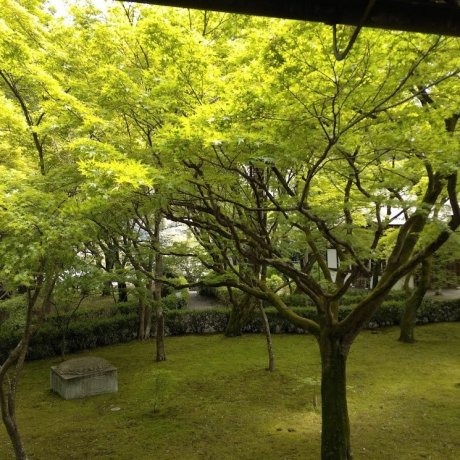
Kyoto’s Temple of Genuine Paradise
Shinnyodo Temple is a zen zone of peace and quiet because of its bounteous green gardens.
Autumn events in Kyoto
While you’re in Kyoto for the leaves, don’t miss out on these other autumn events. Do remember to check the current status of these events in case of scheduling changes due to weather or Covid-19.
1. Kodai-ji Autumn Illumination
From late October to early December, guests to Kodai-ji Temple can slip into a fantasy world of illuminated trees spun from gold reflected in serene ponds like an oil painting on a black canvas. The light-up begins after sunset and goes until 9:30 pm. Be on the lookout for their special projection mapping events for an even more spectacular sight.

2. Gion Odori
Maybe not a famous autumn vista but it is indeed a famous autumn event. The Gion Odori showcases Kyoto’s traditional maiko and geiko dances and music. This event is usually held in early November for ten days at Gion Kaikan near Yasaka and it is definitely a testament to the lifestyle and rigorous training that these ladies endure for their art.

3. Kobo-san Market
The Kobo-san Market is held on the 21st of every month but it reaches huge sizes during autumn, making this the perfect time to snag a deal. Held at To-ji Temple, the market is named to honor the anniversary of To-ji Temple’s founder. This day sees the usually austere temple grounds transformed into a bustling market of wares; from kimono to plates to stationery to geta sandals, you can find just about anything!

Autumn foods
Of course, what is autumn in Japan without some seasonal foods. Be sure to try these autumn dishes that Kyoto specializes in:
1. Kyoto matsutake mushrooms
These admittedly expensive mushrooms have been beloved in Kyoto for centuries. They grow under red pine trees, ergo the name matsutake or “pine mushroom”. These rich and smoky mushrooms are typically used in broths or cooked in rice to bring out their full flavor. Unable to be cultivated, matsutake are all harvested in the wild. Be on the lookout for matsutake gohan, tempura, or matsutake dobin mushi if you want to try these autumn Kyoto dishes.

2. Kuri gohan
The subtle sweetness of chestnuts is a hugely popular autumn treat all around Japan but kuri gohan or “chestnut rice” is a traditional Kyoto dish that dates back to long ago. Although roasting and peeling the chestnuts can be a laborious task, the final product is well worth the time. Sometimes, the dish is served with black sesame seeds or even a sticky-sweet sauce of sugar and soy sauce.

3. Mizuna hotpot
This dish can be vegan or include meat for the carnivores out there. Mizuna is a type of locally grown leafy green also called Japanese mustard greens. It has a piquant and mild pepper flavor that lends itself well to use in soups and broths, making it perfect for hotpot. If you’re lucky, your hotpot will also have some of those rare and delicious matsutake mushrooms in it too.

Autumn in Kyoto: What to expect
The weather in Kyoto in autumn is much milder than the summer and just before the chilling sting of winter arrives. But most importantly, with the arrival of autumn comes those gorgeous colored leaves known as koyo. Look forward to temperatures between 23ºC and 28ºC.
Mid-November is generally the best time to see Kyoto colors, but they begin changing from mid-October and usually last until mid-December. Be prepared for some crowds during peak season, especially at the more popular spots.
Autumn is generally one of the more popular times of the year for visits to Kyoto and for this reason, it is wise to book further ahead when it comes to accommodation and transport arrangements.
